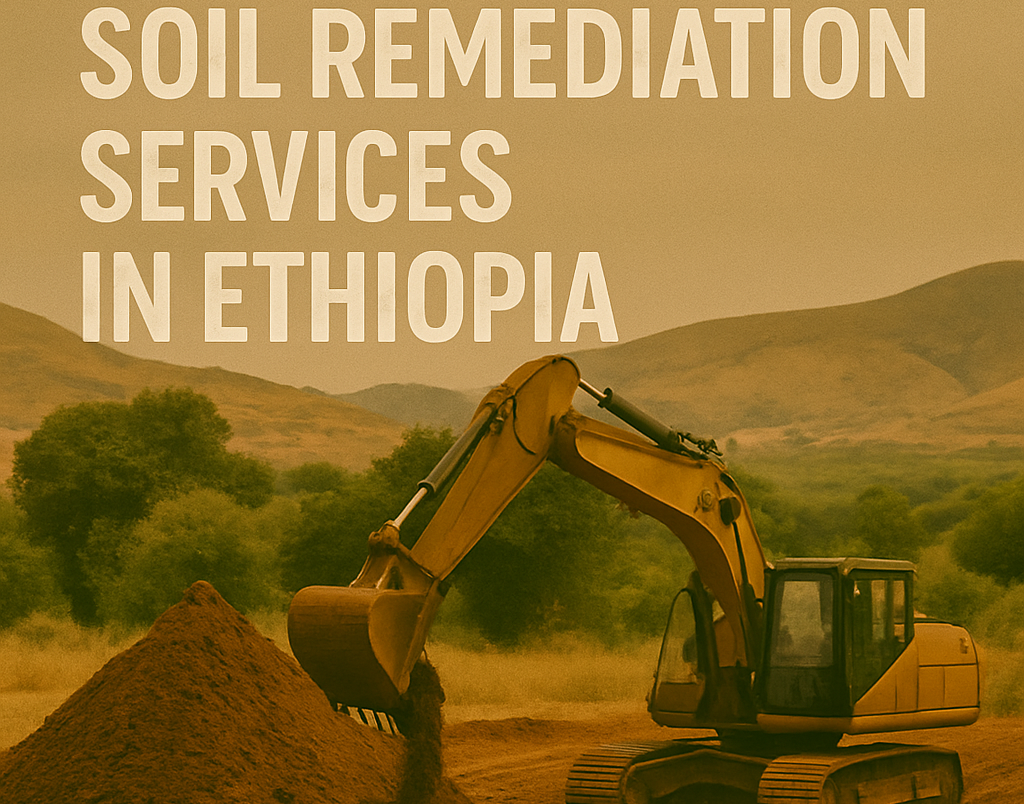Restoring Land and Safeguarding Water
Introduction
Ethiopia, with its vast highlands, fertile valleys, and rapidly growing urban centers, is confronting a serious environmental challenge—soil and groundwater contamination. While agriculture continues to anchor the nation’s economy, unchecked urbanization, industrial growth, and unsustainable farming practices are straining fragile soil systems and scarce water resources. The consequences—ranging from soil degradation and chemical runoff to untreated industrial and municipal waste—are placing food security, rural livelihoods, and public health at risk.
At The Ground Water Company (GWC), we specialize in soil remediation solutions across Ethiopia. Our mission is to restore degraded land, safeguard aquifers, and support industries, municipalities, and communities in meeting environmental standards while driving the country’s vision for long-term, sustainable development.
What Is Soil Remediation?
Soil remediation is the process of cleaning up and restoring contaminated soil to make it safe for people, plants, and animals. It’s commonly used at sites where industrial activities, chemical spills, or improper waste disposal have polluted the ground.
In Ethiopia, the most common sources of soil contamination include:
- Petroleum hydrocarbons – from fuel depots, transport, and industrial activities
- Heavy metals – associated with mining, tanneries, and industrial waste
- Chemical residues – from fertilizers, pesticides, and textile and leather industries
- Salinity and nitrates – caused by over irrigation, fertilizer use, and poor water management in agricultural zones
Soil Contamination Challenges in Ethiopia
Ethiopia’s geography, economy, and development path create unique risks:
- Industrial Expansion – Tanneries, textile factories, and new manufacturing hubs discharge untreated waste that contaminates soil and water.
- Mining Operations – Gold, potash, and other mineral extraction activities release heavy metals into the environment.
- Urban Growth – Rapid expansion in Addis Ababa and other cities generates landfill pressure, untreated sewage, and industrial effluents.
- Agricultural Practices – Overuse of fertilizers and pesticides, combined with soil erosion, reduces land productivity and increases contamination.
- Water Scarcity in Dry Zones – In the Rift Valley and semi-arid regions, aquifer stress makes contamination even more damaging.
Our Soil Remediation Services in Ethiopia
At GWC, we design solutions tailored to Ethiopia’s environmental conditions and regulatory framework:
- Site Assessment & Soil Testing
Soil sampling and analysis to identify contaminants
Risk assessment for human health and environment
Geotechnical surveys to understand soil structure
- Excavation & Disposal
Removal of contaminated soil
Transport to licensed disposal facilities
Landfill management or off-site treatment
3.In-Situ Remediation Services
Bioremediation (using microbes or plants)
Chemical oxidation/reduction
Soil vapor extraction
Phytoremediation
4.Ex-Situ Remediation Services
Soil washing
Thermal desorption
Stabilization
5.Water Treatment
Pump and treat systems
Permeable reactive barriers
Containment systems
6.Monitoring & Reporting
Post-remediation soil testing
Environmental monitoring
Regulatory reporting and documentation
Why Soil Remediation Matters in Ethiopia
- Protects Groundwater Security – Safeguards aquifers that millions of Ethiopians depend on for drinking water and irrigation
- Restores Agricultural Productivity – Ensures farmland remains fertile in a country where farming sustains the majority of the population
- Supports National Development Goals – Aligns with Ethiopia’s environmental protection strategies and growth agenda
- Ensures Compliance – Helps industries and municipalities meet environmental regulations and international standards
- Protects Public Health – Reduces exposure to harmful toxins in rural and urban communities
Other Ground water Services We Provide in Ethiopia
Alongside soil remediation, GWC offers a full range of groundwater services:
- Ground water exploration
- Ground water recharge
- Ground water contamination
- Dewatering solutions
- Flooding solutions
- Hydrological studies
- Ground water seepage
- Ground water remediation
- Flood risk assessment
Conclusion
Ethiopia’s reliance on agriculture, combined with accelerating industrialization and urban expansion, has made soil and groundwater contamination a critical national challenge. Safeguarding these resources is more than an environmental obligation—it is fundamental to ensuring food security, protecting public health, and securing the country’s long-term economic stability.


